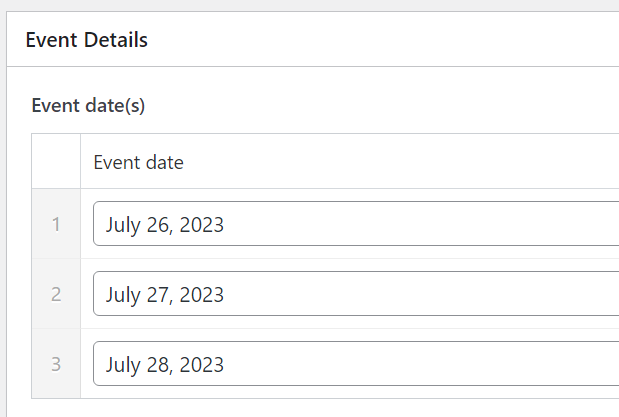I have this query which returns a list of post titles for the current event.
<ul class="event-category-list no-margin no-list-style">
<?php
$current_category = get_queried_object();
$args = array(
'post_type' => 'event',
'posts_per_page' => -1,
'tax_query' => array(
array(
'taxonomy' => 'event-type',
'field' => 'term_id',
'terms' => $current_category->term_id,
),
),
);
$query = new WP_Query($args);
while ($query->have_posts()) : $query->the_post();
?>
<li>
<?php echo the_title(); ?>
</li>
<?php endwhile;
wp_reset_postdata();
?>
</ul>
It works fine.
Also, each post has an ACF date repeater subfield called event_date (format is Ymd) which can have one or more dates.
What also needs to happen
I need my query to not return posts where all instances of the event_date are in the past.
Explaining by example
Let’s say the event is a Foo Fighters concert, and it’s over three dates: 20230726, 20230727 and 20230728 (the ACF date repeater subfield event_date has those three dates).
If all of those dates are in the past, the post title should not be returned.





2
Answers
Instead of working with an ACF repeater fields directly in a meta_query (which would need a more complex SQL queries, such as using a
JOINoperation with a subquery), you can consider:In the functions.php file of your theme (
wp-content/themes/my-theme/functions.php), you can add:The
wpza_replace_event_date_field()function is hooked to theposts_wherefilter using theadd_filter()function in thefunctions.phpfileWhen a new
WP_Queryis created and executed, WordPress internally builds the SQL query. During this process, it triggers theposts_wherefilter, and any functions hooked to this filter will be called.In this case, the
wpza_replace_event_date_field()function will be called, and it will modify the SQLWHEREclause to search for all meta keys that match the patternevent_date_{index}_event_date.By doing so, it ensures that the SQL query includes all rows with keys that represent the
event_datesubfield of the ACF repeater.The loop (
while ($query->have_posts()) : $query->the_post(); ... endwhile;) checks if the event has at least one date today or in the future, and if so, it displays the title of the event.The indirect effect of the
wpza_replace_event_date_field()function is that theWP_Querywill return posts withevent_datesubfields that match the criteria defined in themeta_query.You can use
meta_queryparam for compare dates: